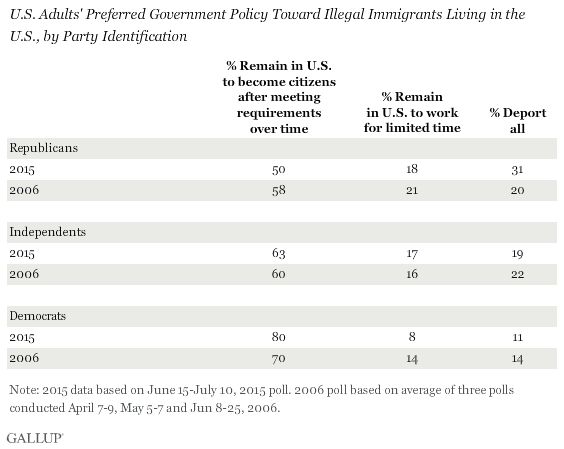On Immigration, Most Voters Aren't Buying What The Parties Are Selling

This weekend saw the candidates sharply carving out their individual stances on the parties' platforms on immigration at the Iowa State Fair.
While Donald Trump dazzled party-hardliners with his plan to change the Constitution to abolish jus soli (right of the soil), birthright citizenship, as well as deporting all illegal immigrants without a path to citizenship, Americans in general don't seem to have as aggressive of a stance on immigration.
Even within the Republican Party, half support a path to citizenship while remaining in the United States.
Independents and Democrats have much more support for this, as well as less of a "deport all" attitude, but the fact remains, all demographics buck the party lines in some way or another.
A lot of this comes from our history, where immigration quotas and limitations have been the rule for far less time than a system of immigrants just "showing up" at freedom's door to be admitted.
From a purely historical standpoint, the model the Founding Fathers left us with is a formula of Residence + Time + Moral Conduct = Citizen.
From a modern standpoint, this has evolved -- and continues to evolve -- into something like: Political Ilk of Immigrants + Immigration Rules and Quotas + Residence + Time + Moral Conduct + Job Availability = Citizen.
We have a convoluted system of immigration rules and quotas, one that lets in people on temporary visas who overstay their permitted time (who make up the largest chunk of illegal immigrants). In short, our own policies have created most of this mess.
Then, a prolonged bad economy makes it less desirable to allow more immigrants in -- yet research time and again shows that these jobs are not ones that even most lower-middle-class Americans would even want.
All of this compounded by the fact that southern states like Texas, New Mexico, and Arizona may see their electoral landscape shift dramatically as recent immigrants gain a larger share of the voting base.
So why are so many not in lock-step with the parties?
Some of this might be a remnant of a twinkling of the American Dream that all of us -- regardless of how far we have to go back -- possess.For some, it's only a few generations. For some, it goes all the way back to the Mayflower. But all of us were once immigrants in a new land, and often were not wanted by the local populations where we struggled to carve out our new lives.
Irish, Italian, Jewish, Polish, Chinese, Russian, Japanese, and Hispanic immigrants, among others, all faced horrible resistance and oppression as they came into our new country.
If our own personal family histories mean anything, then we should in fact honor the struggles of our ancestors who predominately "just showed up" at America's borders, without rules or quotas, hoping to make a better life for themselves.
At this point in history, an open border policy isn't feasible, yet why should we "hate" those who struggle, even to the point of breaking the rules, to get their piece of the American life?
If we truly feel that our way of life is superior and that American exceptionalism still exists, why wouldn't we expect that others would be willing to break the rules to try to get some of it at any cost?
Photo Credit: Dan Holm / Shutterstock.com





